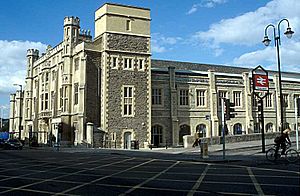British Empire and Commonwealth Museum facts for kids
 |
|
| Lua error in Module:Location_map at line 420: attempt to index field 'wikibase' (a nil value). | |
| Established | 2002 |
|---|---|
| Dissolved | 2013 |
| Location | Bristol |
The British Empire and Commonwealth Museum (grid reference ST597725) was a special museum in Bristol, England. It helped people learn about the history of the British Empire. It also showed how British colonial rule influenced many parts of the world. The museum first opened in 2002. It closed its doors in 2013.
The museum was located in Bristol's historic old railway station. This amazing building was designed by the famous engineer Isambard Kingdom Brunel. It was finished in 1840. The building is over 220 feet (67 meters) long. Its roof spans 72 feet (22 meters). This historic building is so important that it is a Grade I listed building. It was even suggested as a World Heritage Site.
The museum had many interesting things to see. It held a large collection of items from the Commonwealth Institute. It also had many photographs, films, and recorded stories. There was even a collection of historical costumes. These items are now looked after by Bristol Museums, Galleries & Archives. The museum was also home to the New World Tapestry.
Breaking the Chains Exhibition
One important exhibition at the museum was called Breaking the Chains. This exhibit received a large grant to help create it. It marked 200 years since the British Transatlantic Slave Trade was made illegal. This happened because of the Slave Trade Act 1807. The Breaking the Chains exhibition was even nominated for a special art prize.
Museum Collections
After the museum closed, its collections were given to Bristol City Council. The physical objects are now cared for by the Bristol Museum and Art Gallery. The archive collections include papers, books, photos, and films. These are kept safe at Bristol Archives.
Since 2014, Bristol Archives has been working hard. They are cataloging many of the photo and film collections. They are also making them digital. This means more people can see and use these historical records.
See also
 In Spanish: Museo de la Commonwealth y del Imperio británico para niños
In Spanish: Museo de la Commonwealth y del Imperio británico para niños
 | Isaac Myers |
 | D. Hamilton Jackson |
 | A. Philip Randolph |

